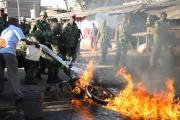
Nairobi — A divided Cabinet on Thursday gave up on a local tribunal and decided to clean up the police force and the local courts and have them try post-election violence suspects.
But it will also hand over those indicted by the International Criminal Court to chief prosecutor Luis Moreno-Ocampo.
And it will change the law to give the Truth, Justice and Reconciliation Commission more teeth besides making its membership more widely accepted.
GA_googleFillSlot( "AllAfrica_Story_InsetA" );
The Cabinet is desperately divided with some of its members suspected to have either masterminded or funded the election violence in which more than 1,133 people killed and about 650,000 evicted from their homes.
Overcome differences
Thursday's decision appears to be an admission that the Cabinet was unable to overcome differences among its members.
It will also likely disappoint many countries, such as the European Union and the US, which have been pressing Kenya to form a special tribunal.
Both the police and the courts are woefully inefficient, enjoy very little confidence from the public and are the reason for widespread impunity.
Julius Mwelu/IRIN
Anti-riot personnel and civilians try to extinguish a burning motorbike set a blaze by rioters in the post-election violence last year.
The Cabinet decision was announced by President Kibaki, flanked by Prime Minister Raila Odinga and the entire Cabinet at State House, Nairobi.
The six-hour meeting, the third in two weeks, was described by Cabinet ministers who attended it but can not named because the sessions are confidential, as "stormy".
Speaking on the lawns of State House, President Kibaki said: "They (suspects) will be tried locally. We are not saying anything about a special tribunal. We are able to try anybody and the laws are there."
But it will also hand over those indicted by the International Criminal Court to chief prosecutor Luis Moreno-Ocampo.
And it will change the law to give the Truth, Justice and Reconciliation Commission more teeth besides making its membership more widely accepted.
GA_googleFillSlot( "AllAfrica_Story_InsetA" );
The Cabinet is desperately divided with some of its members suspected to have either masterminded or funded the election violence in which more than 1,133 people killed and about 650,000 evicted from their homes.
Overcome differences
Thursday's decision appears to be an admission that the Cabinet was unable to overcome differences among its members.
It will also likely disappoint many countries, such as the European Union and the US, which have been pressing Kenya to form a special tribunal.
Both the police and the courts are woefully inefficient, enjoy very little confidence from the public and are the reason for widespread impunity.
Julius Mwelu/IRIN
Anti-riot personnel and civilians try to extinguish a burning motorbike set a blaze by rioters in the post-election violence last year.
The Cabinet decision was announced by President Kibaki, flanked by Prime Minister Raila Odinga and the entire Cabinet at State House, Nairobi.
The six-hour meeting, the third in two weeks, was described by Cabinet ministers who attended it but can not named because the sessions are confidential, as "stormy".
Speaking on the lawns of State House, President Kibaki said: "They (suspects) will be tried locally. We are not saying anything about a special tribunal. We are able to try anybody and the laws are there."










